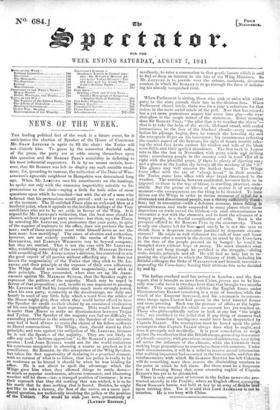right with the plentiful crops, there be plenty of ripening
sun; and a glance at the leaden sky betrays all the mockery of the "if." The glance may well unnerve the boldest heart. The Whigs leave office with the cry of "cheap bread" in their mouths : the Tories come into office with dear bread threatened in the weather. The antithesis, however accidental, however little to be imputed to them in the way of blame, is startling, practical, unde- niable. But the praise •or blame of the matter is of secondary moment—the consequences are the thing to be dreaded. To have driven out the Whigs in order to devise measures of relief, for a distressed and discontented people, was a vittory sufficiently thank- less; but to encounter—with a deficient revenue, taxes failing in productiveness, and trade suspended in many places where those dependent on trade crowd the thickest—in such circumstances to encounter a war with the elements, and to front the advances of a hungry people, is a fearful complication of evils. Such is the prospect offerel to Sir ROBERT PEEL by the summer-sky. There is only one chance left for him-4*nd surely he is not the man to shrink from a desperate recourse justified by desperate circum- stances? He might as well withstand the rush of man and beast to the water after a march in the desert, as stand by the Corn-laws in the face of the people pressed on by hunger : he would be trampled down without hope or mercy. Ile must abandon what he could not keep though he perished in the struggle,—sliding scale, details, principle and all. He will find no help but in re- peating the expedient to which the Ministry of 1826, including his faithful colleague the Duke of WELLINGTON and himself, resorted— suspending the Corn-laws; leaving their ultimate fate to be decided by and by.


























